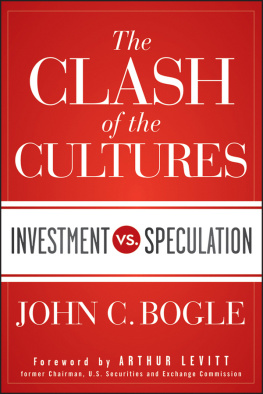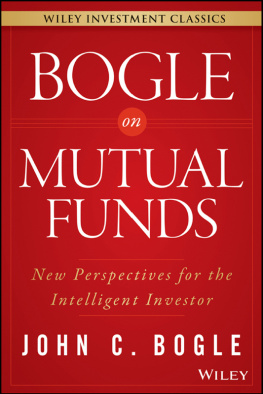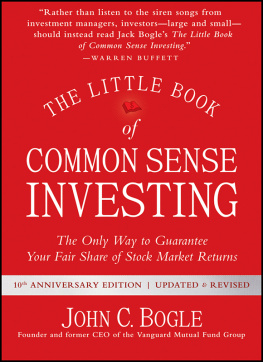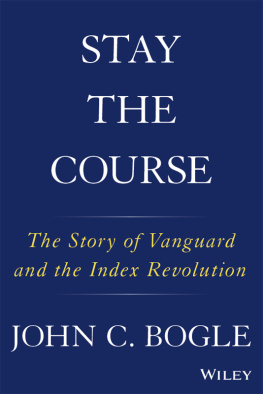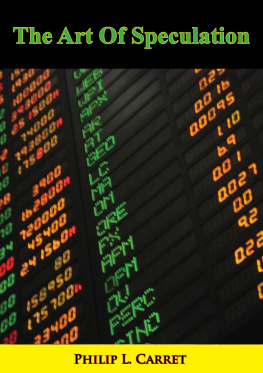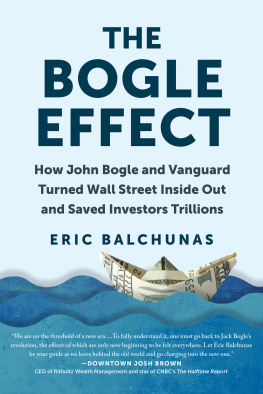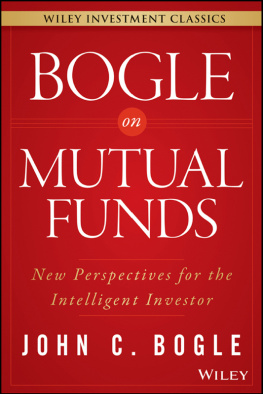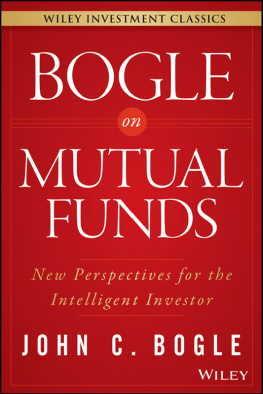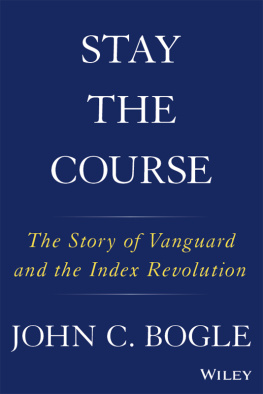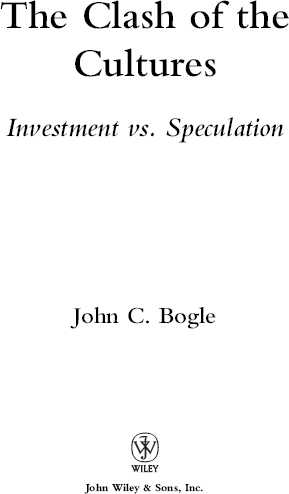Contents
BOOKS BY JOHN C. BOGLE
1994 Bogle on Mutual Funds: New Perspectives for the Intelligent Investor
Foreword by Paul A. Samuelson
1999 Common Sense on Mutual Funds: New Imperatives for the Intelligent Investor
Foreword by Peter L. Bernstein
2001 John Bogle on Investing: The First 50 Years
Foreword by Paul A. Volcker, Introduction by Chancellor William T. Allen
2002 Character Counts: The Creation and Building of The Vanguard Group
2005 The Battle for the Soul of Capitalism
Foreword by Peter G. Peterson
2007 The Little Book of Common Sense Investing: The Only Way to Guarantee Your Fair Share of Stock Market Returns
2008 Enough. True Measures of Money, Business, and Life
Foreword by William Jefferson Clinton, Prologue by Tom Peters
2010 Common Sense on Mutual Funds: Fully Updated 10th Anniversary Edition
Foreword by David F. Swensen
2011 Dont Count on It! Reflections on Investment Illusions, Capitalism, Mutual Funds, Indexing, Entrepreneurship, Idealism, and Heroes
Foreword by Alan S. Blinder
2012 The Clash of the Cultures: Investment vs. Speculation
Foreword by Arthur Levitt
Copyright 2012 by John C. Bogle. All rights reserved.
Published by John Wiley & Sons, Inc., Hoboken, New Jersey.
Published simultaneously in Canada.
No part of this publication may be reproduced, stored in a retrieval system, or transmitted in any form or by any means, electronic, mechanical, photocopying, recording, scanning, or otherwise, except as permitted under Section 107 or 108 of the 1976 United States Copyright Act, without either the prior written permission of the Publisher, or authorization through payment of the appropriate per-copy fee to the Copyright Clearance Center, Inc., 222 Rosewood Drive, Danvers, MA 01923, (978) 750-8400, fax (978) 646-8600, or on the Web at www.copyright.com. Requests to the Publisher for permission should be addressed to the Permissions Department, John Wiley & Sons, Inc., 111 River Street, Hoboken, NJ 07030, (201) 748-6011, fax (201) 748-6008, or online at www.wiley.com/go/permissions.
Limit of Liability/Disclaimer of Warranty: While the publisher and author have used their best efforts in preparing this book, they make no representations or warranties with respect to the accuracy or completeness of the contents of this book and specifically disclaim any implied warranties of merchantability or fitness for a particular purpose. No warranty may be created or extended by sales representatives or written sales materials. The advice and strategies contained herein may not be suitable for your situation. You should consult with a professional where appropriate. Neither the publisher nor author shall be liable for any loss of profit or any other commercial damages, including but not limited to special, incidental, consequential, or other damages.
For general information on our other products and services or for technical support, please contact our Customer Care Department within the United States at (800) 762-2974, outside the United States at (317) 572-3993 or fax (317) 572-4002.
Wiley also publishes its books in a variety of electronic formats. Some content that appears in print may not be available in electronic books. For more information about Wiley products, visit our website at www.wiley.com.
Library of Congress Cataloging-in-Publication Data :
ISBN 978-1-118-12277-8 (cloth)
ISBN 978-1-118-22474-8 (ebk)
ISBN 978-1-118-41438-5 (ebk)
ISBN 978-1-118-41437-8 (ebk)
To all of those human beings who have helped to shape my character, my values, and my careermy ancestors; my parentsespecially my beloved motherand my brothers; my loving wife Eve and my children and grandchildren; my teachers; my pastors; my classmates in school and college; my bosses and mentors in finance; my guardian angels in medical care; my truth-seekers in the academy; my colleagues and believers at Vanguard; the Vanguard shareholder/owners, who have given me their trust; and my friends from all walks of life. No man is an island, entire of itself.
Foreword
By Arthur Levitt
There is a motto that Jack Bogle uses from time to time (and he uses it in this book): Even one person can make a difference. And while he uses it to elevate and praise the contributions of a single, relatively powerless person, that motto applies uniquely to Jack Bogle.
Here is a man whose contribution to American finance was not just a well-executed ideathe index fundbut a well-executed philosophy of investing and life. It is a philosophy that has the dual merit of simplicity and proven success.
Having known Bogle for several decades, I have come to appreciate his unique ability to speak to investors in a language that is accessible, lyrical, and yet also bracing. He points out with clarity the inherent conflicts present throughout our financial markets, most notably between the investors interests and those of many financial professionals.
This is a critical complaint in his discussion of mutual funds. Many investors are under the mistaken impression that mutual funds are a secure and relatively matter-of-fact way to gain the benefit of diversification at low cost. In reality, as Bogle richly details here and elsewhere, mutual funds have a large incentive to benefit from the economics of their businesses, rather than look after their investors long-term wealth. Thus we see some mutual funds not only charge outsized fees, but also practice portfolio management strategies that leave investors behind market index averages and overexposed to certain equities, sectors, and strategies.
That Bogle has stood against such practices for decades is no surprise to anyone who knows this man. He is a person of great courage, wisdom, and forthrightness. He has never lost the zeal or ability to go against conventional wisdom, and is strengthened by those moments when he stands alone. Jack Bogle is brilliant and persuasive, and his ability to get to the heart of often complex issues of finance and markets is one of his greatest gifts.
He loves investing and loves what investing can do. He marvels at the miracles possible when corporations and their owners and managers jointly pursue long-term shareholder return to the exclusion of all else. He is the free markets greatest friend: a faithful ally. And yet when he sees the corridors of finance and investment turned into a den of speculation and greed, he does not hold his tongue. He knows the stakes are great.
The Clash of Cultures is definitional, and could well serve as a philosophic and academic grounding for investors of every age. Throughout, his language is disarmingly straightforward. Because of his respect for the investor, he sidesteps glibness and oversimplification. He defines the difference between risk-taking and recklessness. He correlates costs to returns. He explains why indexing works, and why active management usually doesnt. He traces the roots of todays markets to the rise of corporate agents and then investment managersboth of whom form an impenetrable and expensive double-agency layer separating the real investor-owners from active control over their assets.
While some Wall Street professionals may not agree with every word hereor even some of the wordsI hope they read it. One of the greatest threats to the strength of financial markets is groupthink. When regulators, market professionals, investors, and policymakers all share the same assumptions, emerge from the same trading floors, nod to the same broad arguments, and expect the same outcomes, the result is as predictable as it is disastrous. Jack Bogles iconoclasm is a useful tonic to groupthink. We need more like him.

